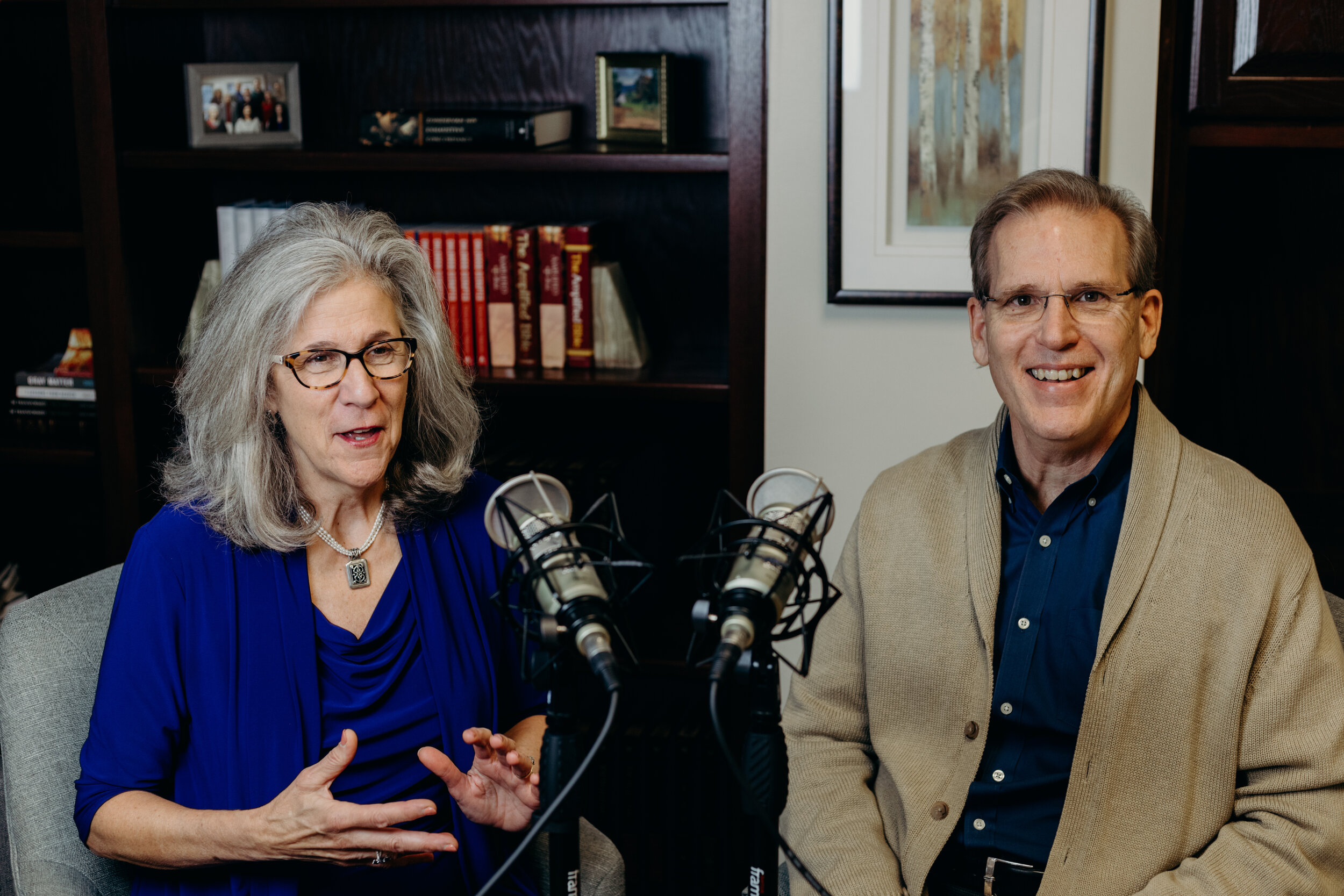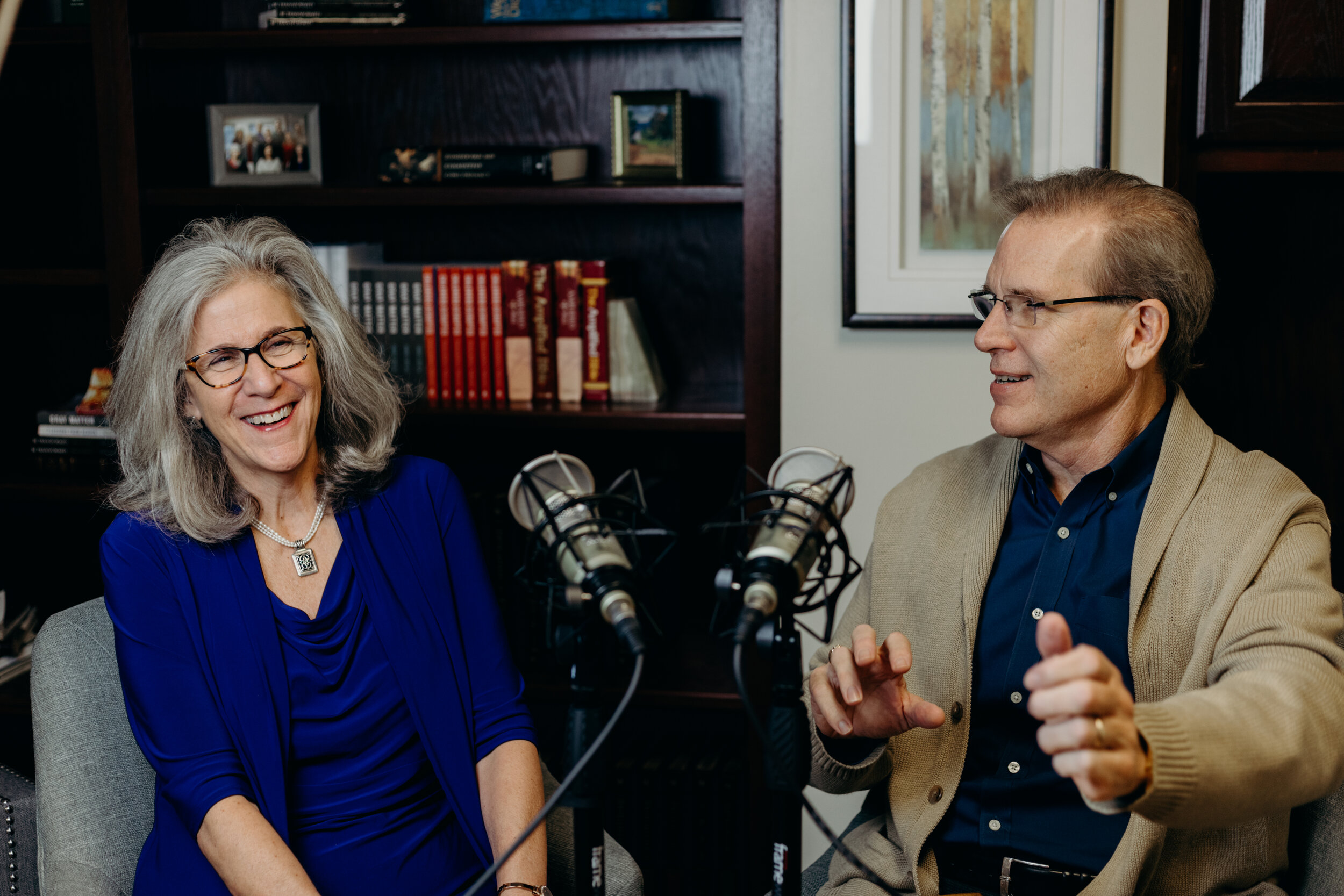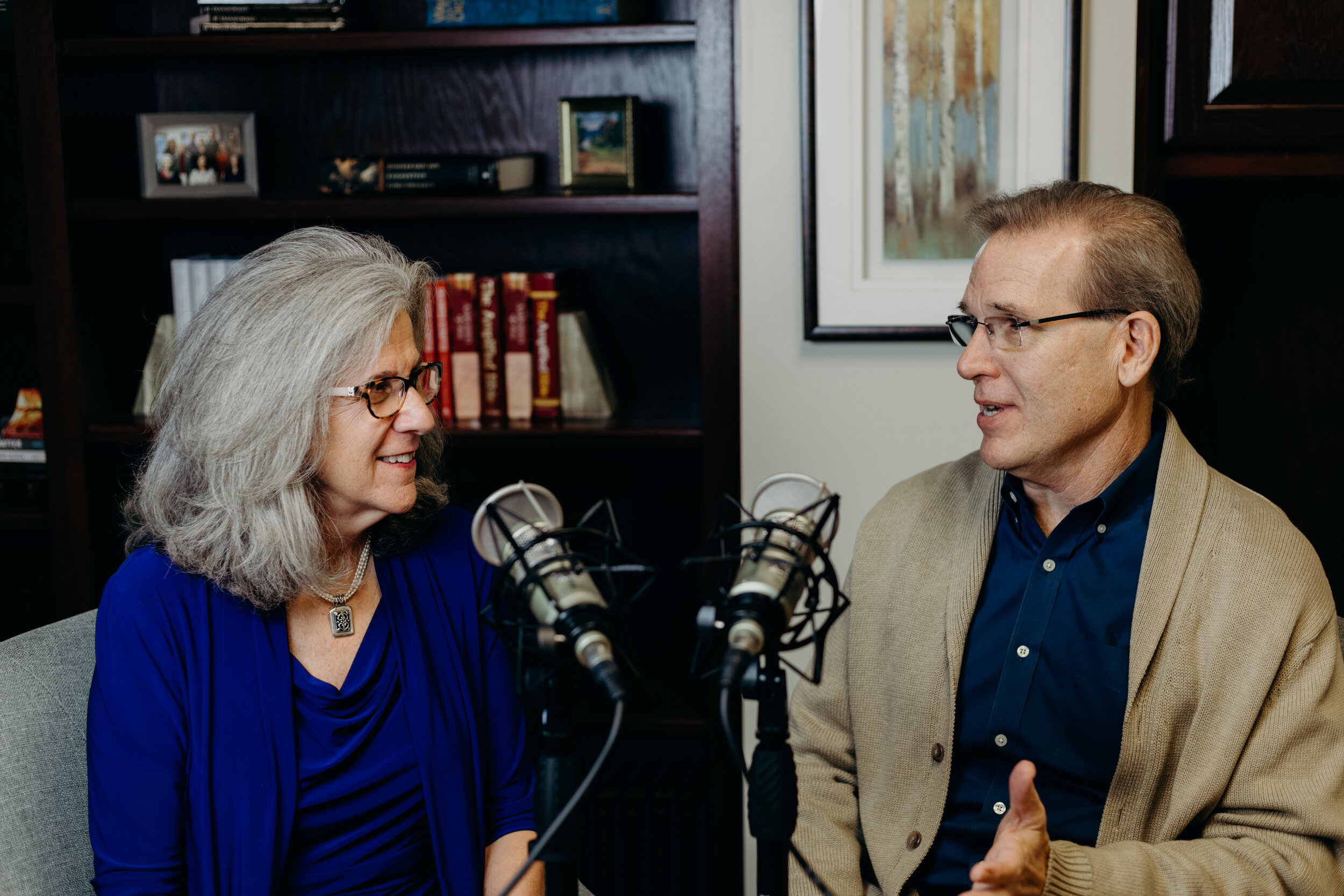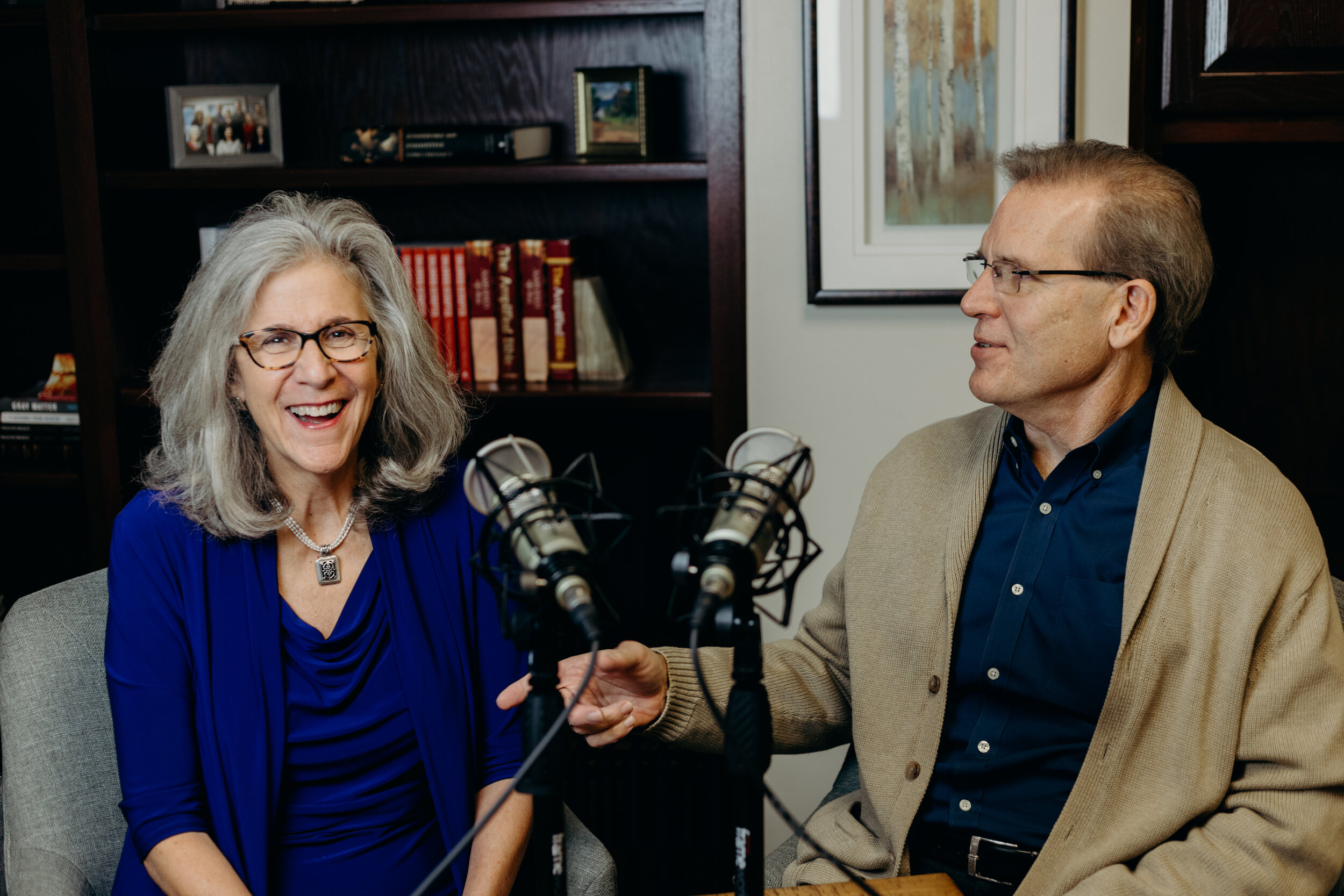Saved and Suffering — How to Experience God’s Abundance Now
Listen to the Episode
Summary
A lack of peace and assurance about life brings people to Rock House Center for help and seems common throughout the body of Christ. It’s what many Christians hoped their faith would provide after salvation but has been elusive. In this podcast we discuss how this can happen and how to engage God in a way that can help believers experience more of the supernatural peace we all want from our faith.
In His Peace,
John and Beth Murphy
Do Note
We have created an 8-day Pathway to Peace devotional course and we are giving it away free to anyone who wants more of the peace God has for them.
-
John Murphy
This is the Rock House Center podcast and I'm John Murphy.
Beth Murphy
I'm Beth Murphy. In our podcast, today is saved and suffering.
John Murphy
But before we get into that, we want to remind everyone that there is a 20% discount before using the word podcast at the Rockhouse Center store. So if you go to rockhousecenter.com, click on the store button, you will have the opportunity to take a look at a number of different resources there. Some of them are free, but for the ones that are not, you get a 20% discount. For all the month of May, I hope you will enjoy those resources.
Beth Murphy
At Rock House Center, we've been helping Christians for over 15 years now and really have a sensitivity to what's going on in the body of Christ and a foundational conclusion that we would make and as what all of our counselors hear is that the body of Christ is going through a tremendous amount of suffering. It's been exacerbated by the events of. The year 2020 and COVID and all of what happened with that, that's really just brought things to the surface. There's no way to get around the truth that the body of Christ is in rough shape and we want to talk about why and big picture talk about the pathway out.
John Murphy
The expectation for Christians certainly is there would be peace and there would be purpose and there would be assurance and there would be a sense of well-being about life. But what we find is that that's really not that true in most cases. Of course, we're seeing people who aren't hurting. So we have a bias towards those folks who are kind of raise their hand and saying. I'm hurting, but the more in which we observe the body of Christ overall, it certainly seems that the promises that we had all wanted to be true in Scripture have it not been manifesting, and the most obvious things that. It appears that people are commonly suffering. Is this sense that they don't have any peace? And then also there's a lot of shame and guilt associated with their status and kind of how they're doing as a Christian.
Beth Murphy
One of the most common things that people say when they get going at Rockhouse Center or even when they initially call is that they've been trying for a long time to get past whatever situation they're in. To get to a place of peace, whether it's stop a behavior or get victory over an emotion like anxiety or. Question and feel like the answer should be in their faith. Sometimes people have been trying to get at that answer for decades and trying to to figure out how it is that God's got the answer. How do I apply scripture? How do I get at getting to the place any of the promises in scripture for the fruit of the spirit, peace and joy and living in that kind of place? That's what we want to get at today is that there are reasons why. And the suffering that's increased by having shame or guilt because of feeling like I should be able as a Christian, to get past this. I shouldn't be stuck in these kinds of places. And so we want to get at that as well in terms of where does it come from and what's the pathway to resolution.
John Murphy
The. The most obvious consistent thread through all of this is that it's about. It seems very clear that Christians trust God and trust God's plan for salvation, but a lot of times it stops there. They don't really trust God for life. They don't trust God for the day-to-day things, and I'm not sure they necessarily understood that they were supposed to. So what we're seeing is that as most Christians would expect that. There is a sense of peace about our salvation, but there's not as much peace about. Life there has been a trusting and ability, a willingness to trust God, for his plan for salvation, but then they feel like life is on them. They don't feel like necessarily God is interested or God is willing, or God has the time. Maybe. But there is this place where we so many believers are trying to fill their deep divine needs trying to fill their peace. Trying to fill their uncertainties, try to get to a level of assure. Difference really by trying to do it in their own strength and not. Trusting God for it.
Beth Murphy
Many people believe that our relationship with God is about salvation, and then once we're in that place and they begin to realize that they're not experiencing the kind of change that they had hoped for or expected. And they kind of it devolves into believing that life is about gutting it out as a Christian. Until Christ returns or we go on to heaven, that the burden of life is all on us, and we're kind of gutting it out in that place here, as Christians and. We just want to focus on that for a moment by saying that that is straight from hell. That's not God's promise. That's not what Scripture is telling us. The promises of Scripture are real. We want to get at the veil that's on our eyes, which all of us have experienced some amount of here or there in our Christian faith. We want to get at wherever you might be personally in any version of that. And help get at the truth of what it is that God's communicating to us about our faith.
John Murphy
I think there is an expectation issue here that there is a sense that Christianity is foundationally, fundamentally about salvation, that that's really sort of the end goal here. But if you look at the second Thessalonians, it gives us some insight into what this process is that we are now a part of. It says that salvation is the first fruit. Of the working of sanctification by the Holy Spirit. So what we see in that phrase is what we are seeing really in the people that we are helping is that there is this focus of salvation, but there's not really an understanding that salvation is really a first step of sanctification, which is a progressively trusting God trusting. Jesus so that we are becoming more and more to a place where we begin to reflect him and we more have more of his nature which is more peaceful and more assured about life. And so it seems as though it's right around there is the expectation that there really isn't anything much beyond salvation and there's a whole lot of expectation to be Christ like in your life. And that there is a lot of burden. There's a lot, as we said before, shame and guilt about not being able to pull that off in their own strength. But it really leaves a whole lot of people in a place of loss of peace, a lot of fear, a lot of anxiety. They begin to trust things other than God for to try to get at peace. And the result is they're soft.
Beth Murphy
When clients come to Rock House center and fill out paperwork with our assessments on several categories, how their their emotional well-being spiritual well-being and physical symptoms? And behaviors and in the spiritual well-being category people will very commonly indicate that they feel like they're really doing well in the category of trusting God and relying on him and then come around later to realizing that, oh, but wait, I guess if I I have anxiety or I guess if I'm depressed or if I. Have bouts of despair or feeling distant from God then. And there's something there that's indicating that I'm actually not trusting God. So we're it's like in our heads, we trust God to the full extent of what we're we know to be true about him and to the full extent of what we're able and perhaps with the foundational kind of belief that's been built on how he was modeled to us. And what we learned early in our lives about the character of God from people who were representing him, but one way or another. We've come to a place where we may think that we're absolutely trusting God and then begin to realize that there's some gaps in that and it's those gaps that we want to get at because getting at that helps us live in that place of trust in this life, trusting God in the burdens of this life.
John Murphy
It's really clear that without trust, we can't have peace. That's just the way God has made. And he's made us to where he's the only thing that we can trust in that's going to give us peace so that we'll continue to search and look for our relationship with him and look for him in our lives and try to engage him more and more. But we can't get to peace without him, as we commonly say at Rock House to the degree to which someone has peace is the degree to which they fully trust God. For everything that they need in life, and that is the only way to get there, we need to remember also to keep this in the context of why did Christ come? Yes, Christ did come to save us. There's no doubt that he did. But it's also clear that he came to take off all of our burdens. He wants us to release everything to onto his shoulders. That is the full proposition of what he's offered when we don't trust him. It's almost like we're not allowing him access to the thing that he has come to do because it wasn't just salvation, it was to release us of all of our burden, that we would substitute the burdens of this world, all of the burdens, all of the heavy burdens of this world would be substituted for the light. Book of Christ to simply submit to come under his leading to come under his rule, to come under his love and his his transformation of our hearts to be and the sanctification that he has for us. All of those things are part of his. Process. But it is through those things that we have the richness that is promised, that we have the peace that is promised. It's through those things that we heal the the ways in which we're suffering. So trust is the key. You have to shift off of the things that we have trusted in to the to him. It's the only way that we can get at peace.
Beth Murphy
There's some assumptions at the point of salvation that can affect our ability to trust God, and we don't really make the connection later on in life as believers. But when we come into our faith initially out of a fear, wanting to escape, going to hell. Then that's a wrong understanding of God from the get go. The feeling that I've got to do this, I've got to turn my life over to Jesus, or else God is going to send me to hell. And that's the reason. That's the motivation, then that foundationally leads to a misunderstanding about the unconditional love of God. His tenderness, his unrelenting pursuit of you. You, the character of God that's underneath the gigantic plan that he had from the very beginning, from the first moment when Adam and Eve made the wrong decision all the way up till the point of the revealing of his plan with the crucifixion and resurrection of Christ. And now day-to-day in your life and his Holy Spirit residing in you. All of that the fear of going to hell completely obliterates really being able to absorb the truth about God's character. And then, of course, it does make it kind of hard to trust him because underneath it all, we're afraid of him. And so that's something to open your heart to thinking. Well, if that was an initial way or initial motivation for your salvation to just be open to asking the Lord to reveal to you the deeper understanding of what your motivation is, his motivation for, for you, for me, for all of us, is authentic love. He loves us, period. He just loves us because he loves us and. He wants to help us love him back and choose him because we love him and that's the character. Ohh God. That's one of the things that can foundationally get us started with and real barrier to trust in God because we get started on the wrong foot in the 1st place and another wrong assumption up front is if we've had teachings or we somehow one way or another came around to the belief that we are transformed at the moment of salvation and that's it. And there's nothing else that needs to be done. And from that point forward. We're supposed to be able to act like Christ and so that is pretty crazy making because it's impossible and it puts a burden on us of acting Christ like out of our own strength and essentially out of our own righteousness. And is backbreaking, and so those two assumptions in the way that we get started at salvation can set us on a track that leads to just, you know, the the Psalm. The hope deferred makes the heart grow sick. It we can be that way as Christians, because we keep trying and trying and trying to get close to God. Trust God to be more like Christ. We can't do that in our own effort or in our own strength. And we can't change our hearts that have had foundational misunderstanding of God from the beginning. The good news here is that we can open our hearts to God, for him to change those foundations and remove the bear. Fears so that we really can receive his authentic love and give it back to him.
John Murphy
So what we need here is more trust. What everybody needs is more trust. I need more trust and no matter where we are on the trust control continuum, the place of trust is where we all want to go. But we're not going to necessarily be able to get there in our own strength. We do have to ask for God to help us and whenever something, it is good that is done and there's glory to be given. From God, it's going to come because of something that he has. And so at Rock House, one of things that we're commonly doing is just asking God to invade our hearts, to lead us to for him, to give us the strength to accomplish thing he wants to give us, to trust him, to show us how to get there. So for those of you who want to get to this next level of trust, I just want to invite you into a prayer. And I just want to start off by just asking the Holy Spirit. To tell you right now what is the thing that you trust in other than God for peace and assurance about life? So just Holy Spirit, show that to them, whatever is just come to your mind. The very first thing is probably the thing that you need to be praying about. And so when we're talking about in this prayer that we want to stop trusting in the things that are not trustworthy, I just want you to be thinking about that thing as we go through this part.
Beth Murphy
Of the prayer. So if you're hungry for peace, then let's pray to God and ask him. To help you trust him so that the life that you had hoped for as a Christian can become your reality. So repeat this prayer after me. Heavenly Father, thank you for your love for me. And the offer of your son. To replace the burdensome yoke of this world. With your son's light yoke. Please forgive me for not trusting you fully. You know, I have done the very best I've known to do. But my effort has not gotten me where I want to be with you. So I reject the things that I've trusted in instead of you. Including self-reliance and everything about my own efforts. And all my ways I've tried to find peace and assurance. Please forgive me for every counterfeit that I've depended on. Father, please give me a new and deeper trust in you. So that I can have this supernatural piece. That will bless me. And glorify you. Lord, I declare my dependency on you for this peace. And I reject any idea that all I need is a commitment to try harder. I've been trying harder for a long time and it has not worked. Please heal me of my lack of trust. As you strengthen me, to trust you more deeply. I pray all this in the name of your son Jesus. Amen.
John Murphy
Amen.
Beth Murphy
So we hope that this prayer and these concepts will really bless you and that you'll pass them on to others who need to hear this as well. You know, at Rockhouse Center, we are on a mission to transform the world with Kingdom principles. And we ask you to join us in that mission, send this podcast to anybody you know who's a believer, who is saved and suffering. We encourage you to send them to our website for free resources. And those of you who have been through the be transformed program at Rock House and you want to get a B transform workbook and take someone else through it, then we encourage you to do that as well. Thank you for listening today. God bless.
John Murphy
Thanks for joining us. Bye.







